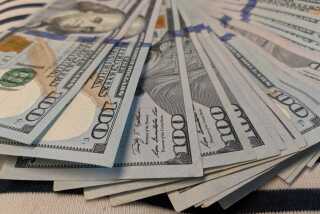Dollar’s Slide Raises Concerns on Policy
- Share via
Confidence in the dollar took another sharp hit Wednesday on speculation that the Bush administration is content to allow the currency’s value to continue declining.
The greenback’s latest slide may be welcomed by U.S. exporters, but will make it more expensive for Americans to travel overseas. Prices of imported goods also may head higher.
The euro’s value on Wednesday touched $1.10 for the first time in almost four years after Treasury Secretary John W. Snow said late Tuesday that he was “not particularly concerned” about the dollar’s slide.
Snow’s comments raised concern that the U.S. is abandoning its so-called strong dollar policy, in place since at least 1995. On Wednesday, Snow said the strong-dollar policy is unchanged -- but many analysts were skeptical.
Snow’s remarks Tuesday were “a clear signal not just for tolerance for further weakness but an explicit attempt to talk down the dollar,” said Tim Stewart, head of currency strategy at Morgan Stanley.
The euro rose as high as $1.1001 on Wednesday, its strongest since March 1999. It ended in New York at $1.097, up from $1.088 on Tuesday.
Among other currencies, the Canadian dollar hit a 2 1/2-year high against the dollar while the Swiss franc reached a four-year high. The British pound and the Japanese yen also rose.
Many foreign investors have been reluctant to buy dollar- denominated assets with a U.S.-Iraq war looming, traders say. The dollar’s appeal also has been lessened by the slowing U.S. economy, low interest rates and declining stock prices.
The slumping dollar hurts Americans’ purchasing power, but some analysts say the Bush administration may want to encourage more weakness in the currency because it can help U.S. multinational firms: Their foreign earnings translate into more dollars as the dollar falls.
The euro’s strength also gives the European Central Bank room to cut its key short-term interest rate, analysts said.
Fourteen of 25 economists surveyed by Bloomberg News expect the ECB, meeting today, to lower its benchmark rate by half a point, to 2.25%.
The euro currency’s health belies the underlying weakness of the euro-zone economy, which experts say may contract this quarter after growing at the slowest pace in almost a decade last year.
More to Read
Inside the business of entertainment
The Wide Shot brings you news, analysis and insights on everything from streaming wars to production — and what it all means for the future.
You may occasionally receive promotional content from the Los Angeles Times.










